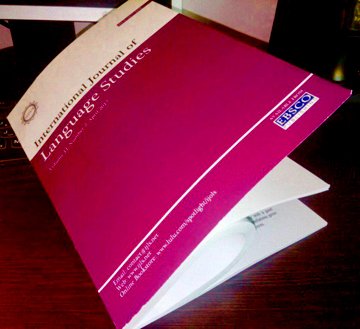International Journal of Language Studies
A Quarterly Journal of Applied Linguistics
ISSN: 2157-4898 | eISSN: 2157-4901
Sherpa/RoMEO Color: Yellow
Editor: Mohammad A. Salmani Nodoushan
January 2010 - Volume 4 issue 1 - Pages 1-58
BACK TO TOP
The relationship among word knowledge, word prediction and reading comprehension
, Azad University of Bandar Abbas, Iran | Contact Author
International Journal of Language Studies, 4(1), 1-28. | Add Print to Cart | Download PDF
Words are the basic units of the language without them one cannot communicate effectively. Having a limited vocabulary is a barrier that prevents students from learning a foreign language. To do this study, sixty university students of English Translation were selected randomely from Bandar Abass Azad University. Participants were of two groups included thirty freshmen and thirty seniors. Two instruments (affixation test and reading comprehension test) were designed and used. Pearson correlation and Independent T-test were run to analyze the relevant data. Findings of the study revealed a significant positive relationship between the students’ word knowledge and their word prediction as well as their reading comprehension. This research has pedagogical implications for EFL students, English language teachers and curriculum developers.
Citation: Sorbi, A. (2010). The relationship among word knowledge, word prediction and reading comprehension. International Journal of Language Studies, 4(1), 1-28.
BACK TO TOP
The relationship between the knowledge of sentence structure and quality of translation
, Azad University of Bandar Abbas, Iran | Contact Author
International Journal of Language Studies, 4(1), 29-46. | Add Print to Cart | Download PDF
Perfect knowledge of sentence structure seems beneficial in providing perfect translation for non-native students. Sixty English translation students studying at Bandar Abbas Azad University were randomly selected and divided into two groups, freshman and senior. The ex post facto design was used for the present research. Two types of instruments, translation and structure tests, were used. After analyzing the data a significant positive correlation between students’ knowledge of sentence structure and quality of their translation was revealed. The results showed that the senior students, whose performance was better than the freshmen on structure test, outperformed the freshmen on translation test too. The findings of the present study have implications for EFL students, English language instructors, translators and curriculum experts.
Citation: Nikroo, P. (2010). The relationship between the knowledge of sentence structure and quality of translation. International Journal of Language Studies, 4(1), 29-46.
BACK TO TOP
On the use of metacognitive strategies by Iranian EFL learners in doing various reading tasks across different proficiency levels
, Takestan Azad University, Iran | Contact Author
International Journal of Language Studies, 4(1), 47-58. | Add Print to Cart | Download PDF
This paper was an attempt to investigate Iranian EFL learners’ metacognitive strategy choice. To achieve this, two research questions were formulated. The first one was to see whether there is any significant difference between the participants’ language proficiency level and their metacognitive strategy choice in doing four reading tasks (scanning, true-false, outlining, and sentence-completion). And the second question concerned the relationship between the participants’ metacognitive strategy choice and their performances on the four reading tasks studied in this project. To this end, 130 female and male university students majoring in English at various levels took the sample version of the IELTS General Training Reading Module, the structure and written section of a TOEFL test, and the metacognitive strategy questionnaire (MSQ). The statistical analyses of the data demonstrated that (a) there was statistically significant difference among the participants of various proficiency levels in their choice of metacognitive strategies due to the impact of language proficiency level, (b) there was a significant positive relationship between the participants’ performances on four reading tasks and their metacognitive strategy choice, except for the relationship between scanning task and evaluating strategies. Implications of the study are discussed.
Citation: Tahamtani Torkamani, H. (2010). On the use of metacognitive strategies by Iranian EFL learners in doing various reading tasks across different proficiency levels. International Journal of Language Studies, 4(1), 47-58.
BACK TO TOP
Copyright © International Journal of Language Studies 2007 - All Rights Reserved
Template by OS Templates

